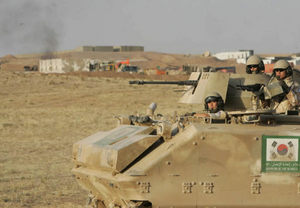 |
Defense ministry has no plans to end deployment
Two years have passed since South Korea’s Zaytun Division was deployed to Irvil, Iraq. In a press release, the South Korean Joint Chiefs of Staff said, "A total of 15,000 troops have been sent yearly to Irvil for the past two years, and they have successfully performed their mission of establishing peace and reconstruction without casualty." Civic organizations against deployment of troops to Iraq, however, said that while most nations that sent troops to Iraq have already withdrawn their soldiers or are preparing for withdrawal, there is no reason for the Zaytun Division to continue to stay. Civic groups plan to hold a major rally calling for the withdrawal of the Zaytun Division. Officials of Ministry of National Defense have not commented on the division’s proposed length of stay in Iraq. Defense Minister Yoon Kwang-ung reportedly ordered officials to keep silent about the Zaytun matter. A military official said on condition of anonymity, "As the problem of extending the deployment of the Zaytun Division, which is a symbol of South Korea-U.S. alliance, could affect the [negotiations surrounding the] transfer of wartime operational command, the government should be careful." Therefore, until the problem of the nation’s regaining of the wartime command is concluded at the South Korea-U.S. annual Security Consultative Meeting (SCM) due to be held in Washington on October 20, Seoul is expected to avoid clarifying its position on extending the deployment of its troops in Iraq. Nevertheless, observers say that there is a movement within the Defense Ministry and the military to seek an extension. Above all, next year’s Defense Ministry budget reportedly allocates about 100 billion won (about US$104 million) for the Zaytun Division. Additionally, the ministry recently gave public notice that it was recruiting 200 additional soldiers to be deployed to Iraq.South Korea initially sent 3,500 troops to Iraq, but it has reduced its forces to about 2,300. However, the government has not yet decided on further reduction. A high-ranking defense ministry official offered his personal opinion, asking not to be named: "The government may be reducing the number of troops under the assumption of extending their deployment for another year." Another official who also asked not to be named said that "if the nation withdraws its troops now, the efforts so far may come to nothing." Some government officials oppose the withdrawal of Zaytun troops because they say it would further damage the South Korea-U.S. alliance. During their Seoul-Washington summit on September 14, President George W. Bush thanked President Roh Moo-hyun and the South Korean government for deploying troops to Iraq. According to a survey performed by Hankyoreh 21 of 100 former Zaytun Division soldiers, 41 percent of the respondents replied that their continued stay in Iraq is due to U.S. request and to strengthen the South Korea-U.S. alliance. Meanwhile, according to those opposed to extending the deployment, because South Korea deployed its troops under the terms of the South Korea-U.S. alliance, the nation cannot benefit from the deployment. Gong Seong-gyeong, an official of People’s Solidarity for Participatory Democracy, said, "When the government decided to send troops, it anticipated it would serve as leverage to allow the government to raise its voice regarding the problems of reshaping the United States Forces Korea (USFK) and dealing with the North Korean nuclear program. However, there has been almost no effect."






